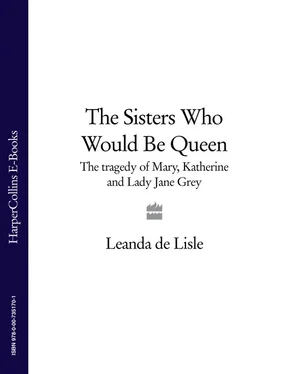Sudeley judged that Somerset’s political position was continuing to weaken as he persisted in his arrogant treatment of his colleagues. In this he was correct. Somerset often ignored advice and once slapped down a Privy Councillor in such a humiliating manner that the man was reduced to tears. Somerset’s most faithful ally on the Council, William Paget, was moved to write to him in the middle of Christmas night, to warn him of disaster ahead. 12 But not everything was going Sudeley’s way. Within the Privy Council it was Sudeley who was judged the immediate threat to national stability. Dorset, aware there was an impending crisis, demonstrated his usual poor political judgement by throwing in his lot with his friend. Whatever happened, Dorset promised Sudeley, he would ‘defend him against all men, save the King’. Night after night during the Christmas season, Katherine and Mary Grey saw their father leave Dorset House for Seymour Place, where Jane saw him arrive along with their great Leicestershire neighbour, Francis Hastings, Earl of Huntingdon. Sometimes Sudeley would leave them to go on forays to court. There were accusations later that Sudeley was planning to kidnap Edward and Elizabeth. Dorset may have hoped he would, believing Sudeley planned a double wedding, with Edward marrying Lady Jane Grey and he marrying Princess Elizabeth. If so it was an ominous portent for Jane of the danger in which her father was prepared to place her in pursuit of his ambitions.
The evidence suggests, however, that for the moment at least, Sudeley was merely picking up gossip from the King’s Groom, John Fowler. Sudeley would moan over a drink in the Privy Buttery to Fowler how he wished Edward were old enough to be independent of Somerset, a time too far off to do him any good. On 6th January, the feast of the Epiphany and the last day of Christmas, Sir William Sharington’s house, Lacock Abbey in Wiltshire, was searched on the orders of the Council and incriminating evidence of his fraud at the Royal Mint discovered. Sharington understood what was expected of him and to save his skin gave up all he knew about Sudeley’s ambitions, including his hopes of marrying Elizabeth. Others were then rounded up. The young Earl of Rutland, whom Sudeley had attempted to recruit as an ally, was called in for questioning at Somerset House in the middle of the night. Terrified, the twenty-one-year-old repeated what Sudeley had said about the need for those who loved the King to build up a following amongst ‘honest and wealthy yeomen who were ringleaders in good towns’. One of Sudeley’s servants had a brother in Rutland’s household and Sudeley learned what the earl had said before morning. He hoped, nonetheless, to brazen it out. The next day he went to Parliament as usual and left at dinnertime with Dorset, to whom he confided what Rutland had said. They ate at Huntingdon’s house and returned to Seymour Place with a group of friends. These included Jane’s youngest uncle, Lord Thomas Grey. In contrast to the brothers Sudeley and Somerset, her father and his brothers were close.
Jane must have known something was wrong from the nervous conversation of the servants. Behind closed doors, Sudeley was boasting that he had been called to see the Privy Council, but had refused to go. Lord Thomas was unimpressed, pointing out that the Council could simply arrest him. He advised Sudeley to trust his brother as ‘a man of much mercy’. 13 Sudeley refused to contemplate it. In the palace next door, meanwhile, Somerset was proving more amenable to advice - the worse for Sudeley. His enemies were insisting to Somerset that his life would only be safe when his brother was dead. That night, the Clerk of the Privy Council, Sir Thomas Smith, and the Privy Councillor and lawyer, Sir John Baker, came to arrest Sudeley. Jane would have recognised the sickly Smith, even behind his long beard and heavy coat. He was a friend of her tutor John Aylmer. Baker, a man in his fifties, was distinguishable by his grey hair; he was old by the standards of the day, but ‘Butcher Baker’, as he came to be called, would send many young men to their graves before his time was up. * Sudeley accepted his arrest quietly, hoping that all would be well. Others, however, proved less sanguine.
When the Council’s men came for Elizabeth’s cofferer Parry, he ran up to his chamber, tearing off his chain of office and crying, ‘I would I had never been born, for I am undone.’ In the Tower the Astleys both gave full confessions, telling all they knew about Sudeley’s plans to marry Elizabeth and his visits to her bedchamber. Only the fifteen-year-old Elizabeth remained composed in her interviews. Faced with the danger she had long feared she defended her servants as well as herself, at times proving forgetful, at times angry over slurs that she was pregnant by Sudeley, but always consistent in her denials that she ever intended to marry anyone without the Council’s permission. It is possible that Parry’s kinsman, William Cecil, was giving Elizabeth vital advice - it would help explain the trust she later developed in him - but Elizabeth was never prone to losing her nerve.
Jane was returned to Dorset Place, while her father, like the other witnesses, was called to the Council for interview. Despite their testimony on Sudeley’s plans, there was no real evidence that Sudeley had ever intended to seize the King, as was claimed, or commit any treason. Ways, therefore, had to be found around the difficulties of a trial. Sudeley had hoped to use Parliament to bring an end to the autocracy of the Protectorate: instead Parliament was used to bring an end to his life. A bill was introduced condemning him for high treason. It was passed without dissension in the Lords. In the Commons there was fierce argument, but in March 1549 a packed House eventually passed the Act of Attainder. Edward was obliged to assent to his uncle’s death in words set down for him, and he did so with visible reluctance. Lady Jane Grey was then left to make sense of the fate of the family of which she had become part. By the end of the year they would all be dead - the baby Mary Seymour dying after illness in the house of Katherine Suffolk to whose care she had been bequeathed, and who resented the expense and inconvenience.
Jane was taught that misfortune came from God as a punishment for sins, but also as a warning to repent. In that sense it could be a blessing, for it gave the sinner the chance to clean the slate. This was how Sudeley saw events, as he explained in a poem composed in the Tower:
… God did call me in my pride Lest I should fall and from him slide For whom he loves he must correct That they may be of his elect.
It was not in Sudeley’s nature, however, to accept his end with passivity. He intended one final throw of the dice, last messages for Elizabeth and her half-sister, Mary, which he wrote in orange juice using a hook ‘plucked from his hose’. The letters were said by someone who saw them to tend ‘to this end, that they should conspire against my Lord Protector’. Sudeley hid his message in the soles of his velvet shoes. 14 They were still with him on the morning of 20th March 1549 when he was taken to Tower Hill to die. 15
Public executions were carefully choreographed and the rituals of a beheading followed a strict code. Prisoners gave a last speech in which they would pronounce themselves judged guilty by the laws of the land, and content to die, as prescribed by the law. It was a final act of obedience, one that acknowledged the supreme importance to society of the rule of law. They would then hold themselves up as examples of the fate of all those who sinned against God and King. If they were innocent of the crime for which they were convicted, they knew that God was punishing them for something, and also that, on some level, they had failed the society into which they had been born. They did not doubt that they deserved to die. Their speeches concluded with a request for forgiveness and the hope their sovereign would reign long and happily. 16
Читать дальше












